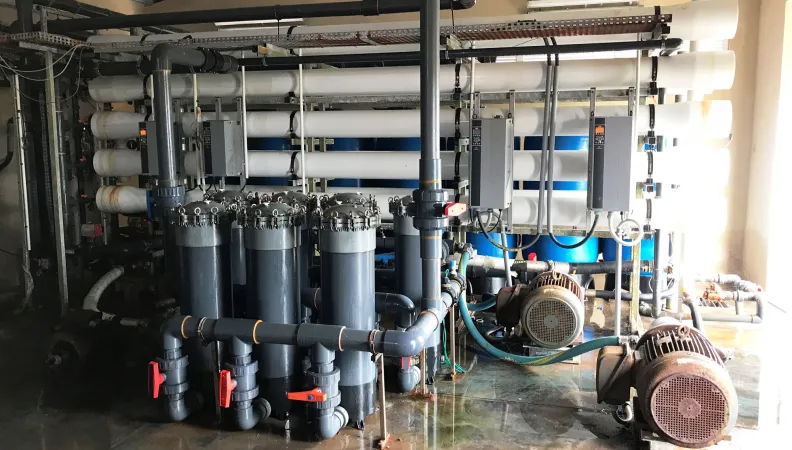Share the page
Desalinate seawater using solar energy (Mascara)
Project


-
Project start date
-
Status
Completed
-
Estimated date of project termination
-
-
Project financing date
-
-
Financing duration
-
2 years
-
Type of program
-
FFEM
-
Global financing amount
-
€ 676 000
-
FFEM financing amount
-
€ 184 000
-
Project lead member institution(s)
-
French Ministry of Economy and Finance
-
Country and region
-
Mauritius
-
Type of financing
-
Beneficiaries
-
MASCARA NT




Water supply is a major issue for small island communities. To address this, the solar-powered seawater desalination technology developed by the company Mascara enables the production of drinking water at low cost and with respect for the environment. The FFEM financed its installation on the island of Rodrigues.
Context
By 2030, 3.9 billion people will be living under water stress. In coastal areas, reverse osmosis desalination is one of the potential solutions. However, desalinating 21 billion cubic meters of water annually to meet rising demand generates 80 million tons of CO₂. The company Mascara has developed a more sustainable solution through its breakthrough innovation in reverse osmosis: it uses renewable energy-based technology, allowing solar-powered operation without pollution or prohibitive extra costs. This feature makes it well-suited for small, isolated island communities with limited energy and financial resources. The FFEM supported Mascara in building and commissioning the innovative OSMOSUN technology on the island of Rodrigues through funding from the Private Sector Innovation Facility.
Description
The project has three components:
- Construct a solar-powered seawater desalination unit with a capacity of 80 m³/day, and ensure monitoring and training of personnel responsible for implementation and maintenance after the first year.
- Reduce costs and environmental impact associated with diesel generators by using solar-powered desalination.
- Offer a technological alternative suited to the limited logistical and technical capacity of island communities. This ultimately enables them to break free from the need for regular fossil fuel supplies, which are often inaccessible to them.
Outcomes
- Use of renewable energy fully aligned with the climate initiative Global Clean Water Desalination Alliance H2O minus CO2 (GCWD) for clean desalination.
- Discharge with low salinity and commissioning of an industrial-scale solar desalination unit for the production of drinking water, with a zero CO₂ emissions footprint.
- Production of drinking water with very low recurring costs, ranging from 30 to 35 euro cents per cubic meter. The proposed technology allows operating costs that are 3 to 4 times lower, as energy-related expenses are eliminated.
Innovative and exemplary features
The OSMOSUN technology developed by the company Mascara was the first in the world to offer seawater desalination using solar energy without batteries. Environmentally friendly and based on renewable energy, it is also cost-effective, enabling isolated island communities to adopt a new technology suited to their needs and their technical and logistical capacities. The project serves as a model example for all islands and coastal regions in the Indian Ocean.
Sustainable Development Goals
ODD6 Clean water and sanitation

ODD9 Industry, innovation and infrastructure

ODD11 Sustainable cities and communities

ODD13 Climate action



